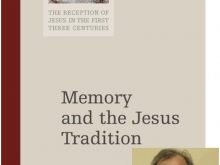Alan Kirk: Misremembering Bultmann and Wrede
In a recent post, Neil cited a paper by Dr. Alan Kirk called “Memory Theory and Jesus Research.” While Kirk does an adequate job of explaining the current state of play in memory theory, I couldn’t help but notice yet again some misunderstandings in the ways Memory Mavens remember German critical scholarship in general and … Continue reading “Alan Kirk: Misremembering Bultmann and Wrede”
